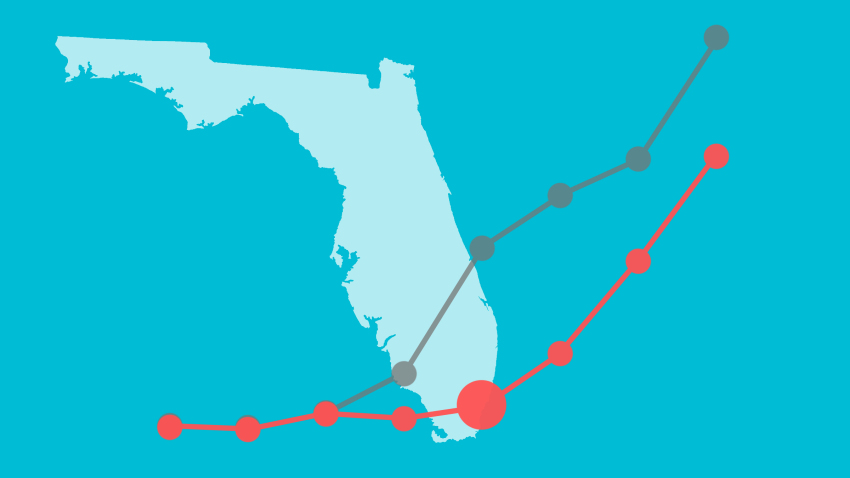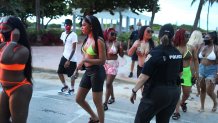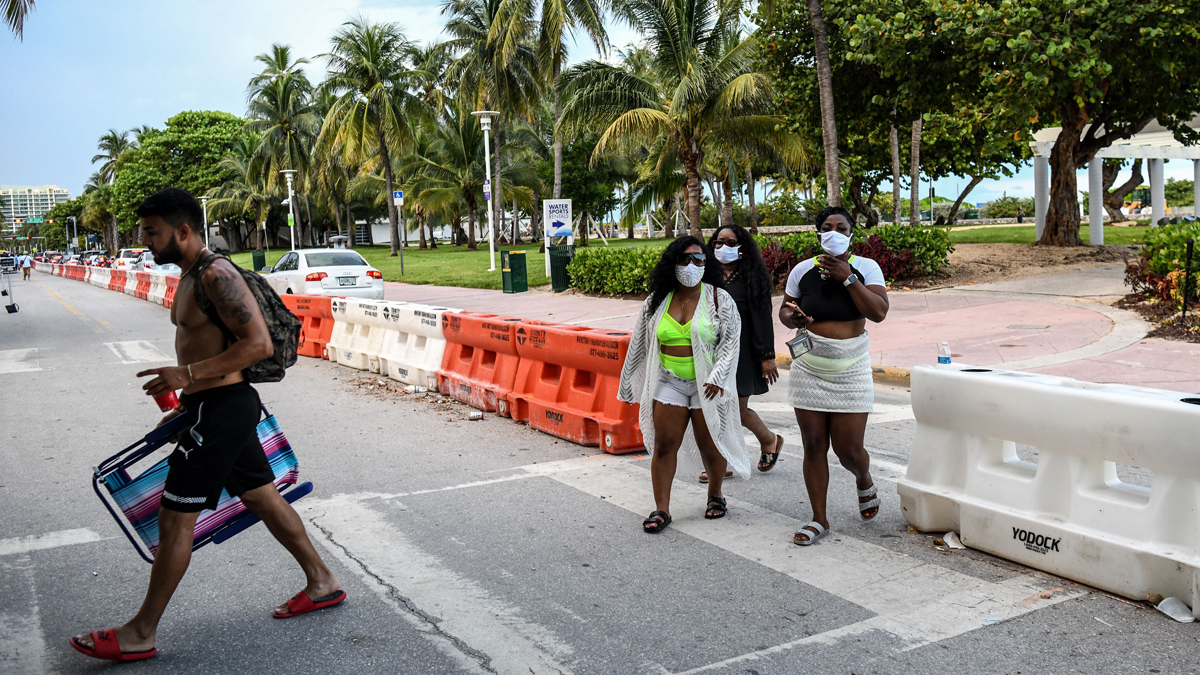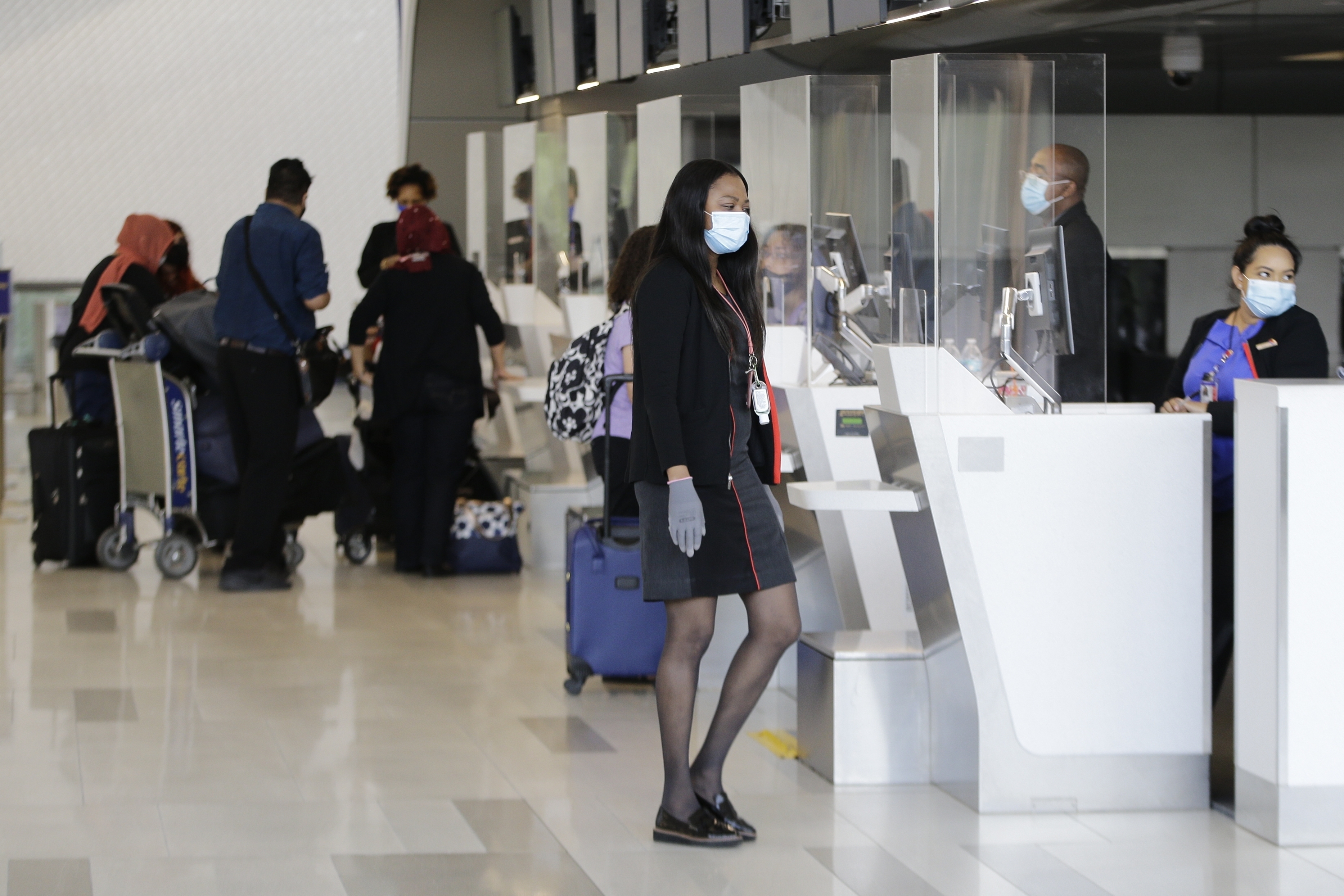What to Know
- Florida reported more than 10,300 new cases Monday, bringing the state's total to more than 360,000
- The state reported 90 new virus-related resident deaths, bringing the death toll to 5,072 since the outbreak began
- Miami-Dade and Broward combined accounted for 43% of Monday's new cases
More than 5,000 Florida residents have now died COVID-related deaths, as the state confirmed 90 more deaths Monday in what has become the deadliest phase of the virus so far.
With 10,347 new coronavirus related cases, the state's total reached 360,394, according to figures released by the Florida Department of Health. The death toll now stands at 5,072 for Florida residents.
The 90 new resident deaths — which are delayed in reporting because of the time it takes to confirm they are COVID-related — continue to fuel the deadliest period in the state, which is now averaging 114 deaths confirmed each day over the last week.
When 111 non-resident deaths are added, Monday's death toll nears 5,200.
In another discouraging sign, the share of all tests returned yesterday that were positive was 18.2%, after several days of that positivity rate hovering around 15%.
While the number of new infections has stabilized in the last week at about 11,000 cases a day, they are still at a relatively high levels, in part because more test results are being processed and reported.
It’s the percentage of those tests that are positive that had been showing some improvement last week when it stayed around 15%. But that changed with the 18.2% positivity rate for results reported Sunday.
CORONAVIRUS LATEST
The daily change in hospitalizations showed signs of decreasing, as it often does on weekends in the department's report. Still, the 292 new hospitalizations was enough to continue driving the seven-day average to a new record of 395 per day.
But a dashboard produced by the Agency for Healthcare Administration shows the number of patients with a primary diagnosis of COVID-19 has been steadily increasing, from about 8,000 one week ago to 9,454 Monday morning.
Statewide, more than 3,055,900 people have been tested for COVID-19, and more than 21,263 hospitalizations for COVID-19 have been reported in Florida to-date.
In Miami-Dade County, the state's most populous and the current epicenter of the outbreak, there were 2,797 new coronavirus cases reported Monday, pushing the county's total to 87,035.
Miami-Dade officials confirmed to NBC Saturday that the county has stopped posting its 'New Normal Dashboard' with coronavirus indicators over concerns that figures provided by the state are inflated.
"County officials are meeting with Florida Department of Health statisticians on Monday to go over discrepancies in the way the state and County collect and report testing data," Patty Abril with Miami-Dade County said in an e-mail.
"Once all agree on the appropriate parameters, Miami-Dade County will be updating the Daily Dashboard to ensure as much of an accurate measure as is statistically possible."
In Broward County, 1,695 new COVID-19 cases brought the county's total to 40,976. Miami-Dade and Broward combined accounted for 43% of Monday's new cases.
Palm Beach County had 26,426 cases, and Monroe County had 894.
As coronavirus cases skyrocket, daily life is looking very different in the Sunshine State, where many popular beaches are shuttered, residents and tourists can be fined for not wearing masks, and bars across the state aren't allowed to pour liquor to toast the carefree days of summer.
Florida recently closed bars again because customers weren’t wearing masks or practicing social distancing. Miami-Dade County again recently prohibited restaurants from having indoor seating and Broward County, home to Fort Lauderdale, announced a two-week curfew Friday that bans most people from being outside from 11 p.m. to 5 a.m. and an order limiting private gatherings, indoor or outdoor, to no more than 10 people.
"It’s a near guarantee it’s going to get worse unless we do something very dramatic to flatten the curve because we’re heading into flu season,” said Dr. Dena Grayson, an infectious disease researcher and former Florida Democratic congressional candidate.
COVID-19 By The Numbers
Click here for a visual look at the virus' impact across the state.

The coronavirus has tapped out intensive care units of some hospitals around the state, and hospitalizations continue to rise, though not quite as steeply as on some days during the past week. Hospitals in Miami, Tampa, Orlando and Jacksonville have reported recent surges and a critical shortage of the antiviral remdesivir.
Critics have complained that Gov. Ron DeSantis has not mandated a statewide mask ordinance as cases rise. The Republican governor has repeatedly said policies in hard-hit South Florida might not make sense in the Panhandle, where the infection rate is lower.
Fellow Republican U.S. Sen. Marco Rubio even acknowledged the need for a unified, nonpartisan message.
“One area where I think we all could have improved on is to sort of come up with a concise message that everyone is putting out there as opposed to some of the conflicting messages. And I think everyone has shared blame in that,” he told CBS4’s Facing South Florida this weekend.
“Instead, we’ve seen a lot of these things turned into sort of a partisan fight or a political statement about whether you’re going to wear a mask or not wear a mask and that sort of thing.”

The criticism has increased as the state’s hardest hit areas are ramping up restrictions, doubling down on mask use and instituting curfews to help reduce the spread.
The Miami-Dade County Commission recently approved an emergency order that gives code and fire inspectors authority to issue tickets of up to $100 for individuals and $500 for businesses that don’t comply with restrictions.
Yet, Walt Disney World reopened its Epcot and Hollywood Studios theme parks on Wednesday. Disney’s Magic Kingdom and Animal Kingdom opened last weekend. Both Universal Orlando and SeaWorld Orlando opened last month.
This summer looks completely different for Dena Drost and her 7- and 5-year-old daughters. Normally, she'd be at work and they'd be at summer camp.
But the 33-year-old marketing director for a restaurant brand has been out of works for more than three months. Her company says she'll have a job to return to as soon as they can safely reopen. But she's fearful what that might look like as Florida's cases continue to rise.
The mall and other spots around her home in Wellington are open, but Drost rarely takes them out, saying “we are at home trying to leave as little possible.”
She's relieved that the girls only complain once a week about all the changes the virus has meant for school, camp and their social interactions. She said she feels anxiety “on a daily basis” and fears she won't be able to protect her children from the virus.
“I feel angry that DeSantis only cares about Trump and is willfully ignorant when it comes to the virus,” she said. “I think there's no excuse for 5,000 dead Floridians.”
Normally, Potions in Motions catering and event company would be in high gear with summer weddings, graduations and corporate events, averaging 25 to 35 a week at their peak and serving 2,000 to 3,000 people.
But this summer, with South Florida’s three counties imposing various restrictions on group gatherings, they’re down to “micro-events,” averaging two to five a week with 8 to 15 people. They’ve had to cut most of their staff. At peak season, they have 65, but are now down to six.
“We’re trying to just stay alive and keep as many people employed,” the company’s founder Jason Savino said. “They’re making so many restrictions by county. You can’t even have a gathering of more than 10 people in your house.”
He understands the need to make changes to curb the spread of the virus, but worries about the economic impact.
“The dialing back scares me,” he said. “There’s no support coming from any government or anywhere that are accommodating these businesses that are being ordered to dial their business back.”



